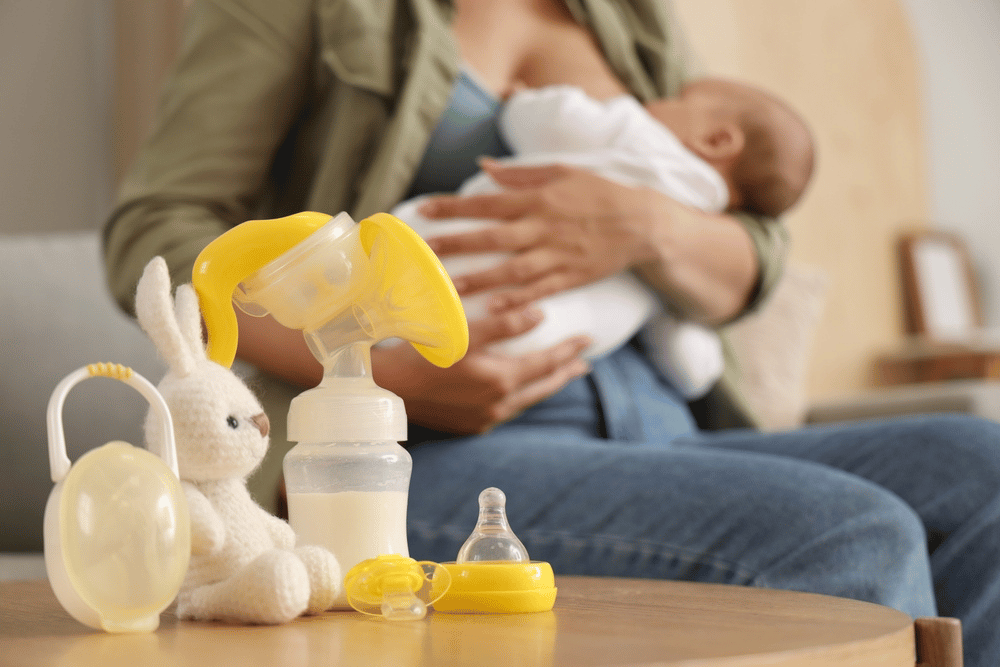
Breasts undergo many changes throughout a person’s life, and one of the most transformative phases is pregnancy. Amid the many physical and emotional shifts happening during this time, breast awareness can sometimes take a back seat. But there’s plenty to be pumped about when it comes to breast health during pregnancy!
One of the earliest signs of pregnancy for many is breast tenderness and swelling. As pregnancy progresses, it’s common to notice breast enlargement, more prominent nipples, and darkening or enlarging of the areolas. During a person’s first pregnancy, the breasts also enter their final stage of development.
Feeding choices for newborns typically include breast/chest feeding or formula feeding. Both are valid options, but organizations like the World Health Organization and the American Academy of Pediatrics recommend exclusive breastfeeding for at least the first six months of baby’s life and for as long as it’s mutually desired, due to its well-established health benefits for both mother and baby.
Health Benefits of Breastfeeding
Extensive research shows that breastfeeding for at least 12 months significantly improves maternal health outcomes. It can reduce the risk of:
-
- Type 2 diabetes
- Hypertension
- Breast cancer
- Ovarian cancer
In fact, a meta-analysis found that a review of 50,000 breast cancer cases over 47 studies from 30 countries that considered how many births a person had and excluded nulliparous women, demonstrated a 4.3% decrease of developing invasive breast cancer. Additionally, breastfeeding may decrease the incidenceIncidence refers to the occurrence of new cases of disease or injury in a population over a specified period of time. of certain types of cancers more than others. Analyses estimate that breastfeeding lowers the risk of developing hormoneA chemical substance produced in the body that controls and regulates the activity of certain cells or organs. receptor-negative breast cancer by about 10%, while the other found a more pronounced reduction of approximately 22%.
For infants, the benefits are just as compelling. Babies who are breastfed tend to experience lower rates of both acuteOccurring suddenly or in a short space of time, as opposed to chronic. and chronic conditions, including:
-
- Otitis media (ear infections)
- Acute diarrheal illness
- Lower respiratory tract infections
- Sudden Infant Death Syndrome (SIDS)
- Inflammatory bowel disease
- Childhood leukemia
- Obesity
- Diabetes
- Asthma
- Atopic dermatitis
Breast Health at Every Stage of Life
Regardless of life stage, it’s important to prioritize breast health. Here are a few ways to stay proactive:
Stay breast aware. Learn how to perform a breast or chest self-exam. Report any visual or physical changes to your healthcare provider.
Follow screening guidelines. Get clinical breast exams and follow age- and risk-based screening recommendations.
Live a healthy lifestyle. Balanced nutrition, regular exercise, and avoiding alcohol and other harmful substances can lower your breast cancer risk.
Getting the Support You Need
-
- Other breastfeeding people can be a great source of support and encouragement.
- Ask the hospital where you deliver your baby if there is a CLC or IBCLC on staff for assistance while you are in the hospital and if there are support groups that you can be a part of post-discharge.
- Reach out to your local Women, Infants, and Children (WIC) programs which offer peer counselor support, an enhanced food package, breast pumps, and other supplies for breastfeeding persons.
- Visit La Leche League International website to find a local La Leche League International support group.
Final Thoughts
A successful breastfeeding journey often results from both personal and structural support, as well as the absence of certain complications or contraindications. Always consult your healthcare team to make the best decision for you and your family.
Sources
Chowdhury R, Sinha B, Sankar MJ, et al. Breastfeeding and maternal health outcomes: A systematic review and meta-analysis. Acta Paediatrica. 2015;104(S467):96-113. doi:https://doi.org/10.1111/apa.13102
Finding breastfeeding support and information | Office on Women’s Health. (2021). OASH | Office on Women’s Health. https://womenshealth.gov/breastfeeding/learning-breastfeed/finding-breastfeeding-support-and-information
Islami F, Liu Y, Jemal A, Zhou J, Weiderpass E, Colditz G, Boffetta P, Weiss M. Breastfeeding and breast cancer risk by receptor status–a systematic review and meta-analysis. Ann Oncol. 2015 Dec;26(12):2398-407. doi: 10.1093/annonc/mdv379. Epub 2015 Oct 26. PMID: 26504151; PMCID: PMC4855244.
Joan Younger Meek, Lawrence Noble; Technical Report: Breastfeeding and the Use of Human Milk. Pediatrics July 2022; 150 (1): e2022057989. 10.1542/peds.2022-057989